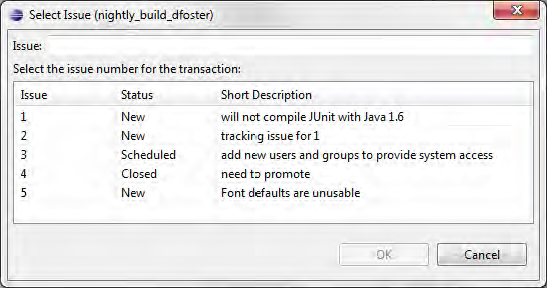Promote-Based Integrations with Issue Management
- Change-package-level.
- Transaction-level.
The integrations are enabled separately, through AccuRev commands that are not available in AccuRev Plug-In for Eclipse. One or both of the integrations are triggered when you invoke a Promote command on a set of elements. You are prompted to specify an AccuWork issue record in a pop-up window.
If only the transaction-level integration is enabled and you do not have a default query defined for the issues database, the prompt window contains a text field into which you type an issue number (or several numbers, separated by SPACE characters).
Otherwise, the prompt window offers a set of existing issue records, from which you can select one or more. You can also enter an issue in the Issue # field. When a “3pty ITS Key” is set in the AccuRev Schema editor, that key is displayed instead of the issue number.

Once you select one or more issues to associate with your changes and click OK, AccuRev Plug-In for Eclipse displays a dialog box that allows you to enter an optional comment that documents the nature of the change or the reason for promoting your changes.
When you click OK to complete the Promote operation:
- The change-package-level integration (if enabled) records the promoted versions on the Changes tab of the specified issue record(s).
- The transaction-level integration (if enabled) records the Promote transaction number in the affectedFiles field of the specified issue record(s).
For more information, see the section titled Integrations Between AccuRev and AccuWork in the AccuRev Administrator’s Guide.